What are Long Tail Keywords?
When it comes to SEO, keywords are everything.
The right keywords can help potential customers find your website, and they can also give you a boost in search engine rankings.
However, choosing the right keywords can be tricky.
Some businesses focus on short, popular keywords that are difficult to rank for. Others target long-tail keywords, which are longer and less popular but may be easier to rank for.
So, which is the better strategy?
Let’s look at what are long tail keywords, why they matter, some examples that may surprise you, and decide if they really are the best SEO strategy for your small business.
Let’s get started.
What are Long Tail Keywords?
Long tail keywords are simply longer and more specific phrases (usually 3-5 words long) that potential customers use when searching for products or services online. Compared to shorter, more general keywords, long tail keywords tend to have less search volume but can be much easier to rank for.
Why do long tail keywords matter?
For many businesses, long tail keywords can be a key part of successful search engine optimization (SEO) strategy. By targeting these more specific phrases, you can often get your site to rank higher in search engine results pages (SERPs), driving more traffic and leads.
And that means more sales. Cha-ching.
What are the benefits of long tail keywords?
There are several benefits of targeting long-tail keywords, including:
1. Less competition
Since long-tail keywords are more specific, they usually have less competition than shorter, more general keywords. This means it can be easier to rank in search engine results for long-tail keywords.
2. More targeted traffic
Long-tail keywords are often more specific than shorter keywords, which means they can attract more targeted traffic. If someone is searching for a long-tail keyword, they are usually further along in the buying cycle and more likely to convert into a customer.
3. Increased ROI
Because long tail keywords are often easier to rank for and can attract more targeted traffic, they can also lead to a higher return on investment (ROI).
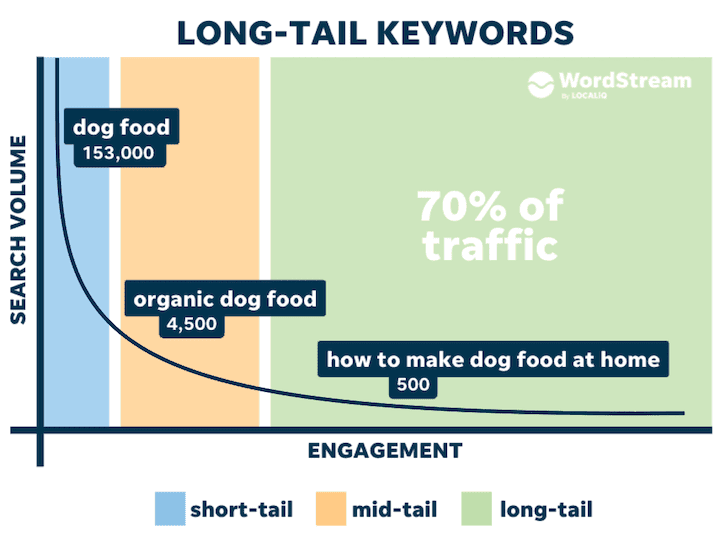
Long Tail Keywords From Wordstream.com
How to find long tail keywords?
There are a few different ways to find long tail keywords, including:
1. Use keyword research tools
There are a number of different keyword research tools available, like Google AdWords Keyword Planner and SEM Rush. These tools can help you find long tail keywords related to your business. (More on those later.)
2. Look at search results
Another way to find long tail keywords is to simply look at the search results for your industry. Look at the first 10-20 results and see what kinds of phrases they are targeting.
3. Ask your customers
One of the best ways to find long tail keywords is to simply ask your customers what they would search for if they were looking for your product or service. This can give you some great insights into the kinds of phrases they are using.
Let’s look at some real long tail keywords in action.
Long tail keyword examples
Rather than search for the short one-word popular term, like “marketing,” let’s look at some related long tail keywords.
Long Tail Keyword Finder – Ubersuggest
I am going to hop into Ubersuggest and type in marketing in the keyword ideas section:

The thing to look at here is the search volume (110k) and the difficulty – in the last column (85).
As you can see, the one-word search term “marketing” is very popular but is also very competitive and will be very difficult to rank for (SEO Difficulty over 66 showing in red).
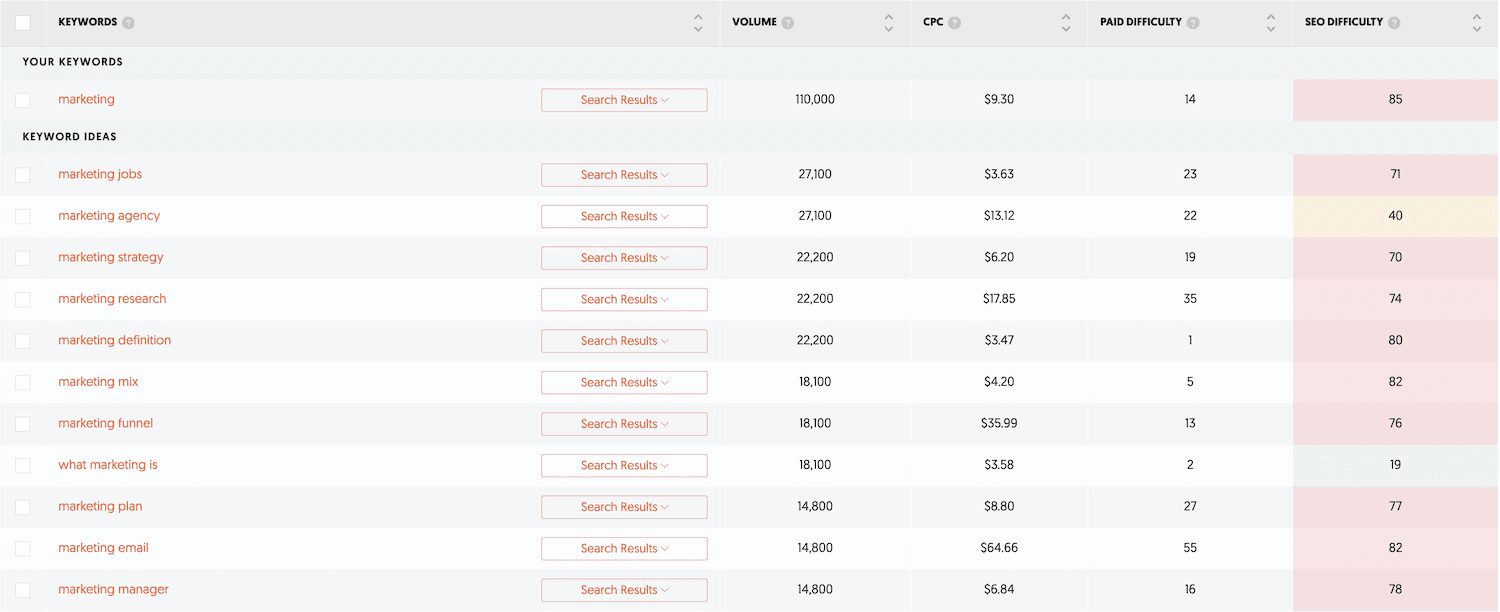
Even the longer two-word terms are all mostly competitive. But what if we look for long tail keywords related to marketing.
At the top of the search are some other options: suggestions, related, questions, prepositions, and comparisons. You should look through each of these sections in your long tail keyword research to find the best keywords. Sometimes you won’t find anything, and sometimes you find a goldmine.

For marketing long tail keywords, I found the best if I scrolled down under suggestions. Look at all those terms with a ton of search volume and all in green for SEO difficulty.

and all of these too!

For marketing, there was still a lot of competition in the prepositions and comparisons. So let’s use a long tail keyword to start with.
What if I search for “small business marketing?”

That term by itself is still pretty high difficulty coming in at 85, but look at all the options under related that are low-competition but still have a good search volume.
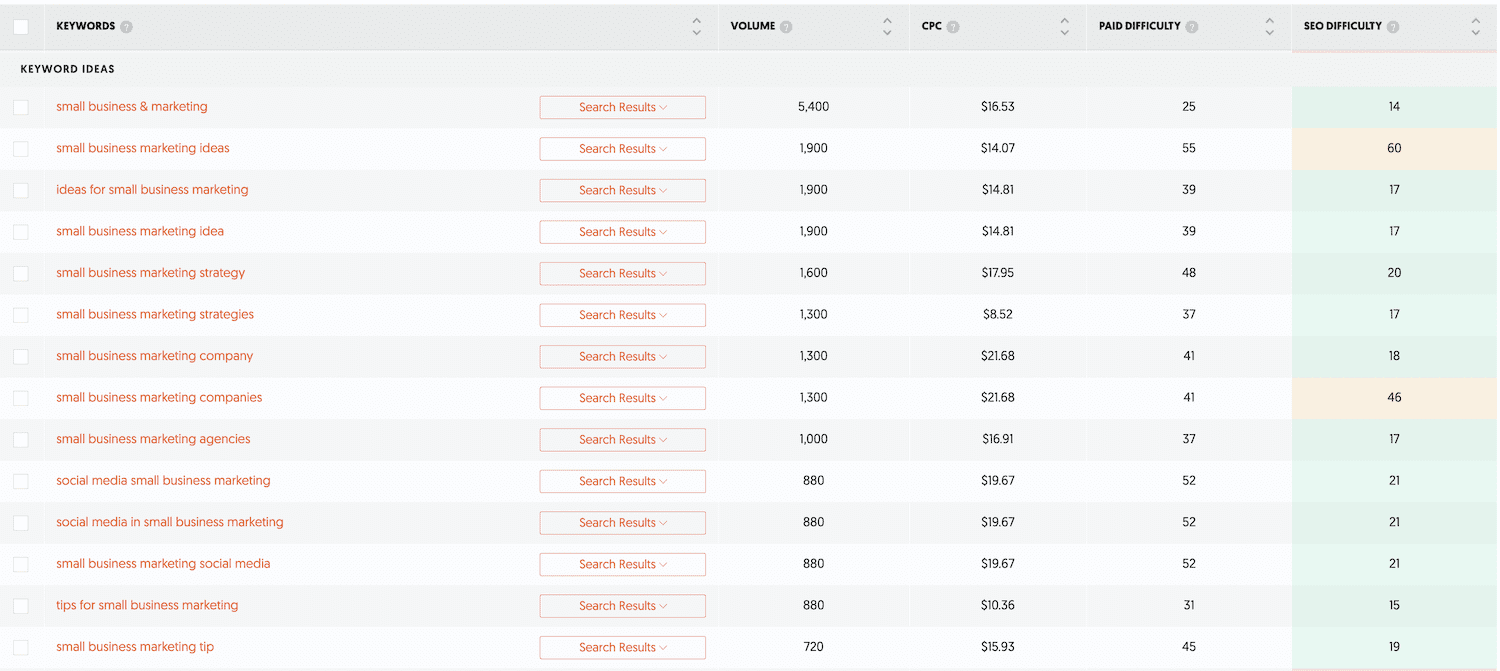
Let’s try one more.
If I look at the term “SEO” – it has a very high search volume, but look at the competition. 87 yikes!

But just scrolling down in suggestions, look at all of these long tail keywords that have high search volume and low competition.
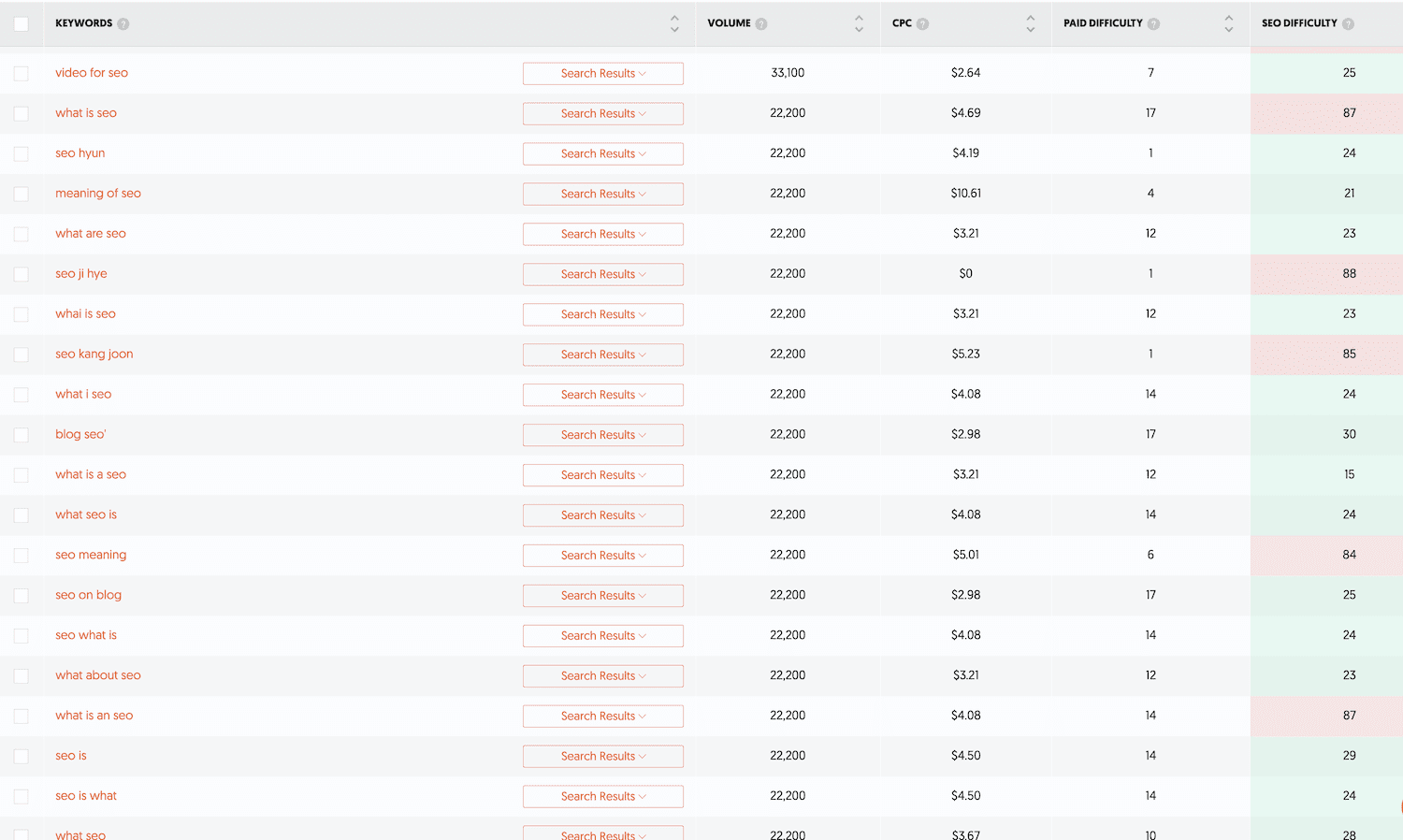
As you can see, these keywords are all very specific and targeted. They are also much easier to rank for than a shorter, more general keyword like “SEO” or “marketing.”
TAKE ACTION: Go to Ubersuggest and give this a try with your keywords.
Long Tail Keyword Research Tools
There are other tools you can use to research and find keywords.

Enter any keyword and get millions of keyword suggestions organized by groups and subgroups.

Just search for any word that defines your niche in Keywords Explorer and use the search volume filter to instantly see thousands of long-tail keywords.
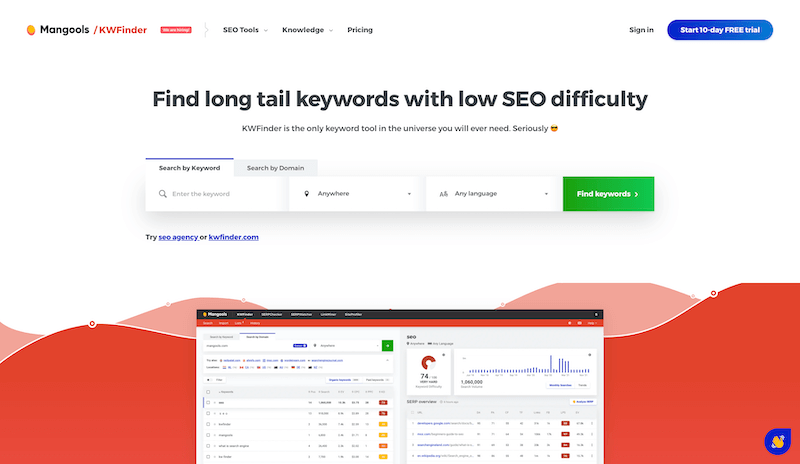
Find long tail keywords with the exact search volumes and precise keyword difficulty score. Perform keyword analysis with critical SEO metrics in a super user-friendly interface.

Discover the best keywords for your SEO and PPC goals. Keyword research can be a slog, but our free tool makes it a cinch to find the best keywords to target for your paid and organic campaigns.
Try each out and see which one you like best. 🙂
How to find Quality Long Tail Keywords
Here’s the thing, though. You can find a boatload of keywords that you could totally rank for right now. BUT are they the right words?
When looking for the best keywords to rank for, you need to look at not just how competitive they are but also the search volume and if the term relates to your business and your goals.
Let’s look at the SEO example from earlier.
Look at all of these low-competition long tail search terms I found. (this is where you say “oh, ah”).
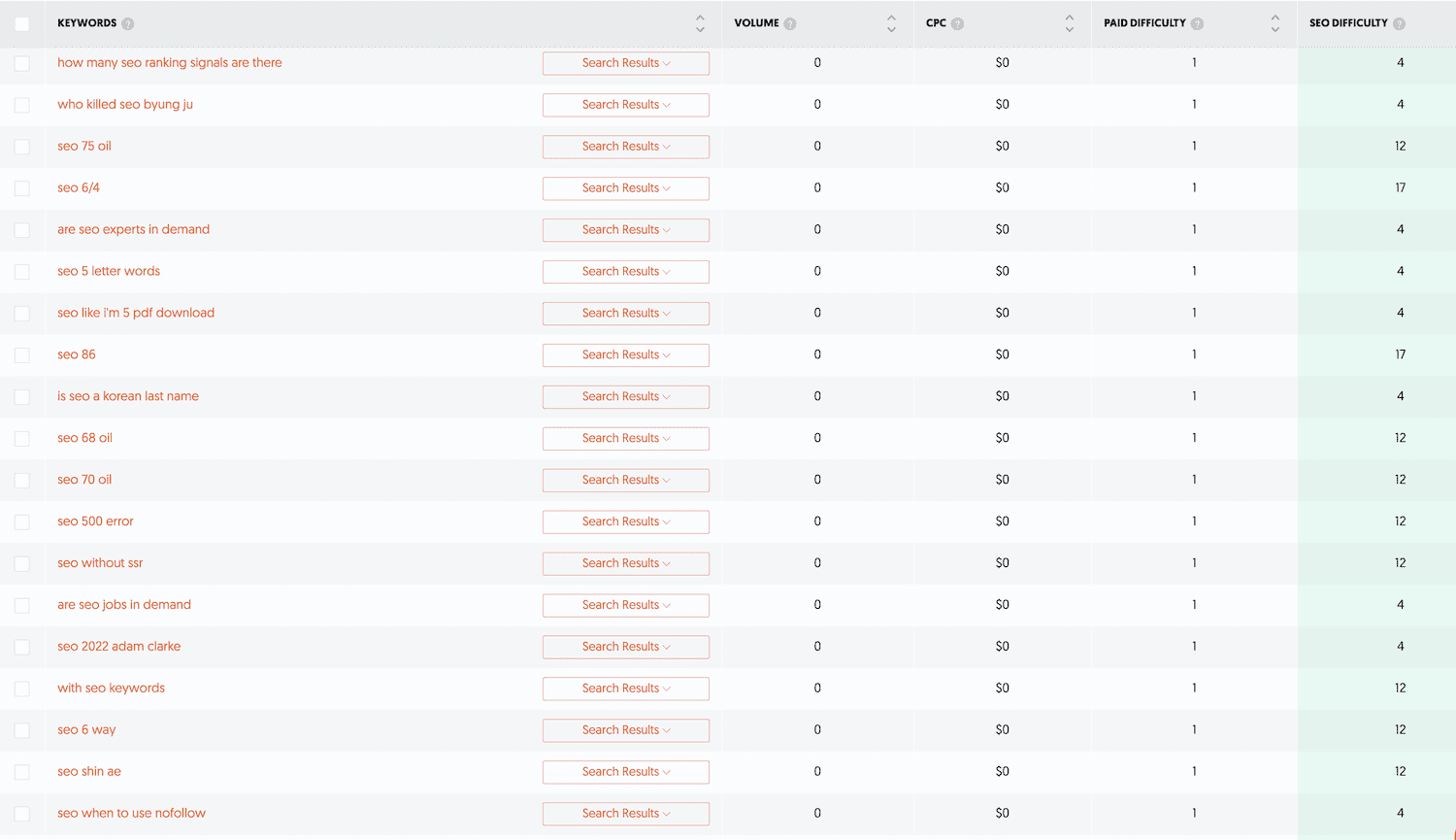
So, yes, I can probably rank for these terms, but as you can see, NO ONE IS SEARCHING for them, so this does us no good.
Do not make the mistake of spending all your time on content marketing – making content that no one is searching for. And as you can see, it’s pretty easy to see how many people are searching each month for terms.
Now, what about relating to your business goals.

Look at this one, 22k searches a month and only a 24/100 – I can probably rank for that one!
BUT Seo Hyun is an actor, and not a marketing term, so it would not do me any good to even try to rank for that term.
Make sure your terms are the right terms that align with your business goals and your products and services. Otherwise they do you no good either.
Long Tail Keywords and Your SEO Strategy
As you can see, targeting long tail keywords can be a great way to improve your SEO strategy and drive more targeted traffic to your site. If you’re not sure where to start, try using a keyword research tool like Ubersuggest or SEM Rush, or try asking your customers what they would search for.
An example of long tail keywords in action
Remember my quest to find answers for my shoulder pain? I wasn’t sure what I needed (Chiropractic, Massage, Sports Therapy?), so I searched “shoulder pain”.
What I found was a bunch of chiropractic and massage results, with no content on “shoulder pain” but instead just a landing page for me to book an appointment.
Then I found one rehab place near me that actually had a whole page on shoulder pain. They talked about the causes of shoulder pain (and I was like, yep, that’s me), then how to fix it yourself, and then how they could help with shoulder pain.
They said we offer chiropractic, sports massage, and other therapies that can fix your shoulder pain. Make an appointment and we will figure out what solutions will work best for you.
This place didn’t just create content for the short-term “Chiropractic” but created a strategy around the more specific, long tail keyword “shoulder pain.”
Not only did I find specifically what I was looking for, but I also felt they were equipped to fix my issue.
What specific issues are your customers searching for?
How can you deliver content around these search terms?
Are Long Tail Keywords the Best SEO Strategy?
There is no easy answer. There are pros and cons to using long tail keywords.
While long-tail keywords may be easier to rank for, they will generate less traffic than short, popular keywords (that you may not be able to rank for).
For example, I probably can’t rank for “SEO,” but I may be able to rank for the term “SEO Google My Business.”


As a result, it is important to consider your goals and how authoritative your website is currently when choosing keywords. If your website has a lot of authority and your goal is to generate a lot of general traffic from search engines, then you can focus on popular keywords.
However, if your goal is to improve your ranking in the search results, then targeting long-tail keywords may be the better strategy.
A balance of what you can rank for and what your customers are searching for
Ultimately, the best approach for most businesses is to use a mix of both short and long-tail keywords to ensure that your website is visible to both potential customers and search engines.
And remember, you don’t have to have crazy tech skills, boatloads of cash, or a dedicated marketing department to market your business. In fact, you don’t even need a lot of time.
What you need is to be smart. And long-tail keywords are a smart strategy for getting found online.
Want to know more about SEO? Check out the SEO for Beginners Series.
Have any questions? Leave a comment below!
About Digital Marketing Expert Torie Mathis
 Torie Mathis helps entrepreneurs, like you, use digital marketing to grow your business without wasting time, money, or your sanity. She is a best-selling author, Army veteran, speaker + trainer, and your digital marketing coach. You don't need crazy tech skills, buckets of cash, or dedicated staff to market your business. In fact, you don't even need a lot of time. What you need is to be SMART.
Torie Mathis helps entrepreneurs, like you, use digital marketing to grow your business without wasting time, money, or your sanity. She is a best-selling author, Army veteran, speaker + trainer, and your digital marketing coach. You don't need crazy tech skills, buckets of cash, or dedicated staff to market your business. In fact, you don't even need a lot of time. What you need is to be SMART.
Torie hosts SMART AF, a show for non-techy entrepreneurs looking to grow their business, with her husband Sean and is the creator of SMART AF Magazine. Learn from Torie at the Smart Arsenal and on her channel.
What do you think? Let's talk! Leave a comment.
YOU MAY ALSO LIKE

Is Your Marketing Taking You Away From The Things You Love?
What if you could get amazing results from your marketing without spending more time, more money, AND it was easy and predictable? Sean and I have suffered through it too, and we found the answer...
Hi! I'm Torie!
 I help entrepreneurs (like you) use digital marketing to get more clients + make more money. And I make it easy!
I help entrepreneurs (like you) use digital marketing to get more clients + make more money. And I make it easy!
You don’t need crazy tech skills, buckets of cash, or dedicated staff to market your business. You don’t even need a lot of time.
What you need is to be SMART.
Smart Marketing For
Get Smart AF
DELIVERED TO YOUR INBOX
from your Digital Marketing Coach Torie Mathis!
Let's get SMART!
Let's Connect!

*Posts may contain affiliate links. If you use these links to purchase, I may earn a commission at no additional cost to you.





 I help entrepreneurs learn digital marketing.
I help entrepreneurs learn digital marketing.












0 Comments